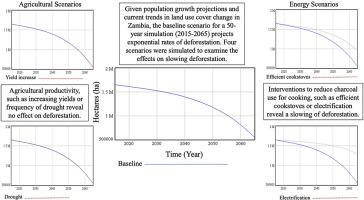Agricultural Systems ( IF 6.6 ) Pub Date : 2021-08-26 , DOI: 10.1016/j.agsy.2021.103263 Robert B. Richardson 1 , Laura Schmitt Olabisi 1 , Kurt B. Waldman 2 , Naomi Sakana 3 , Nathan G. Brugnone 1

|
CONTEXT
Agriculture faces tremendous pressure to supply both growing and wealthier populations with more food, fiber, and fuel, while recognizing the limits of agricultural ecosystems. But it remains unclear whether it is possible to increase agricultural and food production without increasing deforestation and associated greenhouse gas emissions.
OBJECTIVE
The objective of this study was to advance the understanding of landscape-level implications of sustainable intensification of agriculture on forest conservation in Zambia. Sustainable intensification aims to increase agricultural yields and reduce deforestation. Miombo woodlands, a dry forest ecosystem common throughout the region, are the dominant biome in much of Zambia, and they are suitable for the production of charcoal, a commonly used cooking fuel among urban households.
METHODS
We used participatory system dynamics modeling to examine the drivers of deforestation in two provinces in Zambia. We modeled four scenarios to examine their effects on reducing deforestation over a 50-year simulation period: (i) an increase in maize yield from adoption of SI practices, and (ii) occasional moderate and severe drought events, (iii) adoption of efficient charcoal cookstoves, and (iv) full electrification.
RESULTS AND CONCLUSIONS
We found no effects of adoption of sustainable intensification practices on agricultural encroachment into forested ecosystems. The clearing of forested land for agriculture was found to be largely driven by the rising demand for wood fuels for cooking and heating, particularly charcoal in urban areas. Charcoal was increasingly dominant as a driver of deforestation in both provinces such that changes in land practices and economic returns to farmers are unlikely to reveal measurable changes in land use.
SIGNIFICANCE
The findings have implications for the development of integrated approaches to address the challenges of food and energy insecurity, as well as for national-level policies aimed at climate change mitigation and reducing greenhouse gas emissions. This study provides a unique and innovative approach to integrating social and biophysical/ecological data through the application of system dynamics modeling. Furthermore, the study contributes to the literature on the environmental implications of agricultural land use and the drivers of deforestation.
中文翻译:

模拟干预措施以减少赞比亚的森林砍伐
语境
农业面临着巨大压力,需要为不断增长和富裕的人口提供更多的食物、纤维和燃料,同时认识到农业生态系统的局限性。但尚不清楚是否有可能在不增加森林砍伐和相关温室气体排放的情况下增加农业和粮食产量。
客观的
本研究的目的是促进对可持续集约化农业对赞比亚森林保护景观层面影响的理解。可持续集约化旨在提高农业产量并减少森林砍伐。Miombo 林地是该地区常见的干燥森林生态系统,是赞比亚大部分地区的主要生物群落,适合生产木炭,这是城市家庭常用的烹饪燃料。
方法
我们使用参与式系统动力学模型来检查赞比亚两个省森林砍伐的驱动因素。我们模拟了四种情景,以检查它们在 50 年模拟期内对减少森林砍伐的影响:(i) 采用 SI 实践提高了玉米产量,以及 (ii) 偶尔发生的中度和重度干旱事件,(iii) 采用高效的木炭炉灶,以及 (iv) 全面电气化。
结果和结论
我们发现采用可持续集约化做法对农业侵占森林生态系统没有影响。为农业开垦林地的主要原因是对用于烹饪和取暖的木材燃料的需求不断增长,尤其是城市地区的木炭。木炭越来越成为这两个省森林砍伐的驱动因素,因此土地做法的变化和农民的经济回报不太可能揭示土地利用的可衡量变化。
意义
研究结果对制定综合方法以应对粮食和能源不安全的挑战,以及旨在缓解气候变化和减少温室气体排放的国家级政策具有重要意义。这项研究提供了一种独特的创新方法,通过应用系统动力学建模来整合社会和生物物理/生态数据。此外,该研究对有关农业土地使用的环境影响和森林砍伐的驱动因素的文献做出了贡献。


























 京公网安备 11010802027423号
京公网安备 11010802027423号